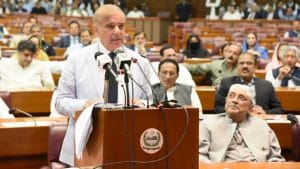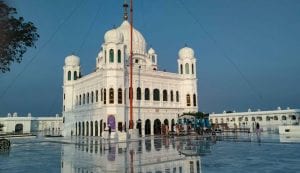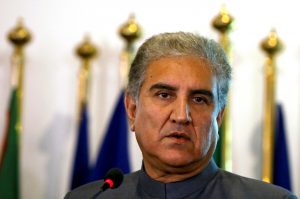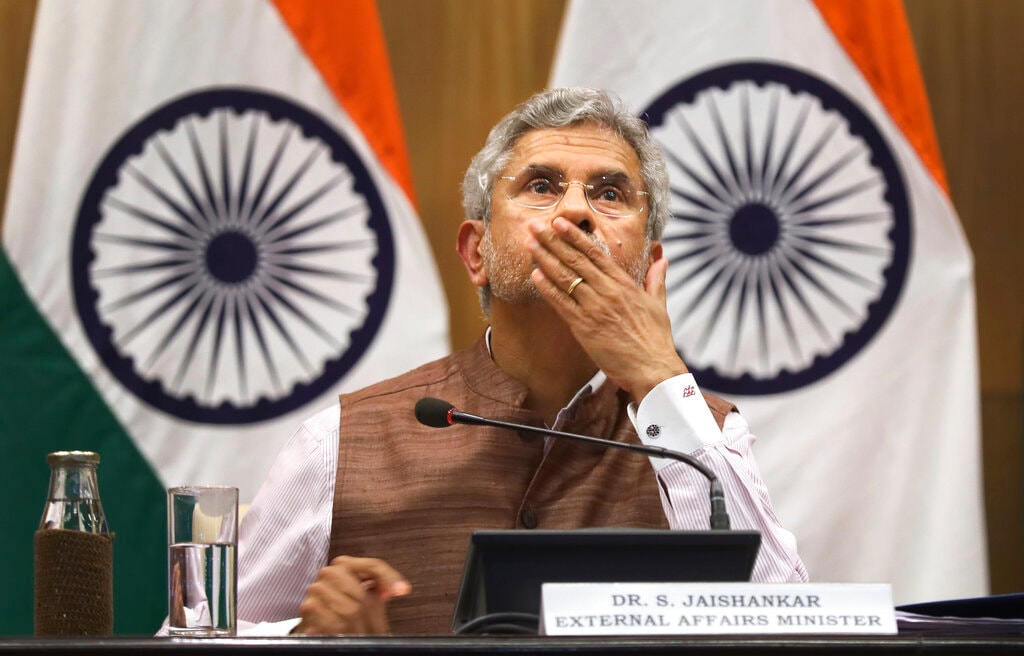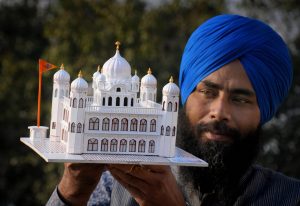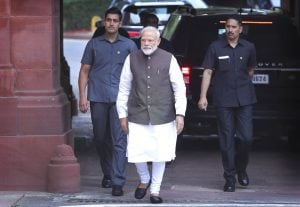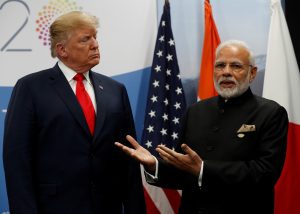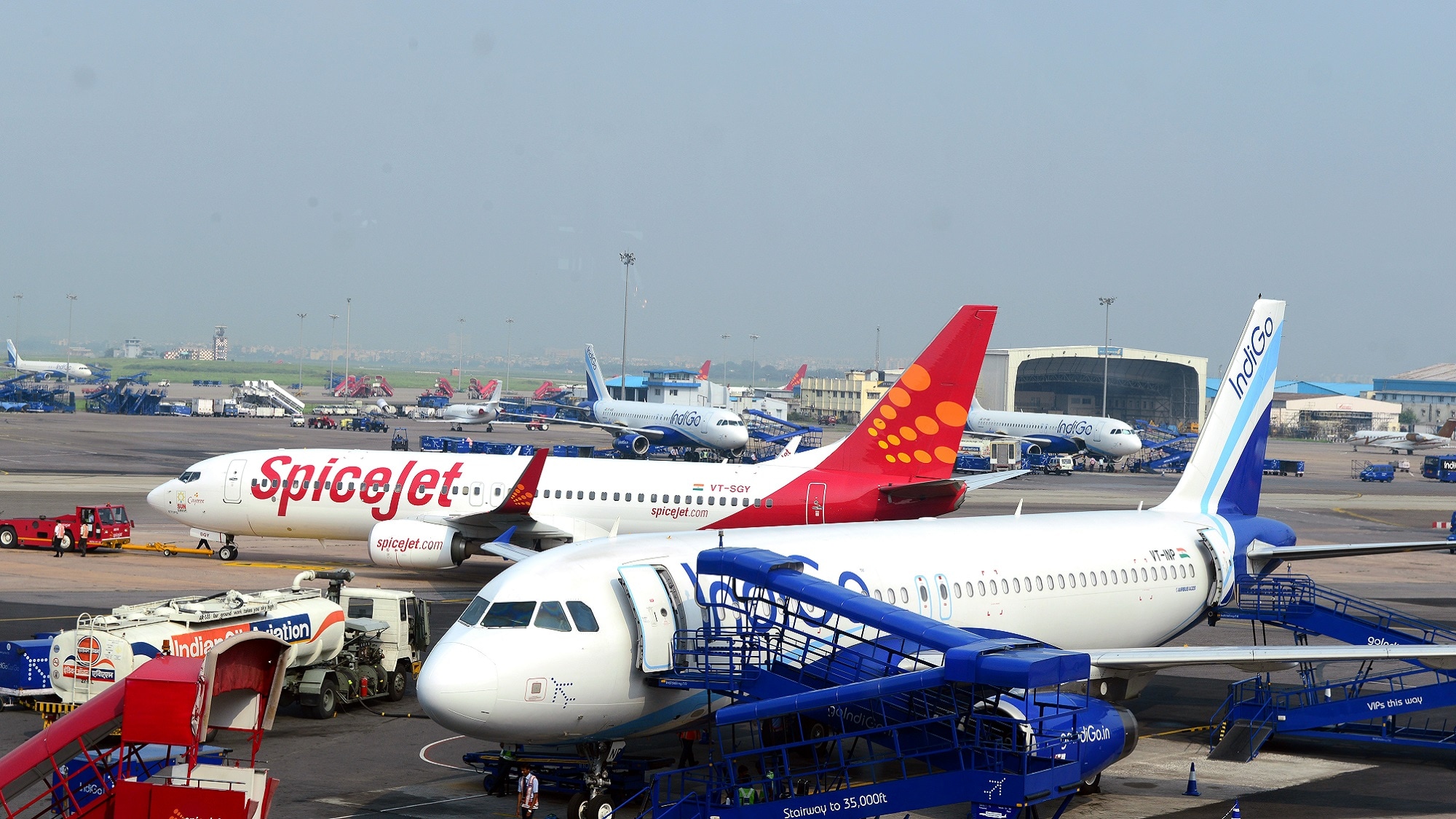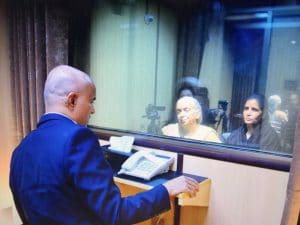Our decision on Jammu & Kashmir is driven by national interest, not politics, says PM Modi

KV Prasad Jun 13, 2022, 06:35 AM IST (Published)
 Listen to the Article (6 Minutes)
Listen to the Article (6 Minutes)
Summary
With Prime Minister Narendra Modi completing 75 days today in his second avatar as the nation’s helmsman, he speaks extensively to IANS on his priorities going forward and also touches upon various sensitive issues varying from Jammu & Kashmir, medical reforms, criticality of education to taking the knife to the tumor of corruption within the bureaucracy.
With Prime Minister Narendra Modi completing 75 days today in his second avatar as the nation’s helmsman, he speaks extensively to IANS on his priorities going forward and also touches upon various sensitive issues varying from Jammu & Kashmir, medical reforms, criticality of education to taking the knife to the tumor of corruption within the bureaucracy. In an extensive conversation with IANS Editor-in-Chief Sandeep Bamzai, the Prime Minister walks him through the most contentious issues facing India and his remedies for the maladies.
Part-1
You complete 75 days of your government today. Every government passes through such milestone numbers and talks about steps taken. Why should we think your government is any different?
We have set an unprecedented pace within just the first few days of our government. What we have been able to achieve is the result of ‘Spasht Neeti, Sahi Disha (Right Intentions, Clear Policy)’. In just the first 75 days of our government, a lot has happened. From children’s safety to Chandrayaan-II, from action against corruption to freeing Muslim women from the scourge of Triple Talaq, from Kashmir to Kisan, we have shown what a resolute government with a strong mandate of the people can achieve. We have taken a head-start in tackling the most pressing issue of our times, with the formation of Jal Shakti Ministry for a mission mode and integrated approach to improve water supply and augment water conservation.
Did the unprecedented mandate help you firm up your commitment to the people of India with an unstinting resolve that reform has to percolate down? And you have used your political heft by going beyond the executive and using the mandate in the legislature?
In a way, it is also the result of the government coming back with a stronger mandate. What we were able to achieve in the first 75 days was the outcome of the robust base we were able to build in the last 5 years. Hundreds of reforms in the last 5 years have ensured the country is now ready to take off, powered by the aspirations of the people. The first session of the 17th Lok Sabha has been a record-creating one – it was the most productive session since 1952. This is not a minor achievement but, in my view, a historic turn for the better and one which will make our Parliament much more responsive to the needs and aspirations of the people. Many momentous initiatives have been taken such as pension schemes for farmers and traders, reform of the medical sector, important amendments in the Insolvency and Bankruptcy code, beginning of labour reforms I could go on and on. But the gist of the matter is that when the intentions are right, there is clarity of purpose and implementation, and there is people’s support, then there’s no limit to what we can do.
Also Read: Our outreach to the Gulf at a political level has been unprecedented, says PM Modi
There has been some noise on the medical reforms front from various quarters. Do you think the changes you have brought in are well thought through?
When we formed the government in 2014, there were many concerns about the existing system of medical education. Earlier, courts have used strong words for the institution overseeing medical education in India, calling it a “den of corruption”. A parliamentary committee did rigorous study and took a very dull view of the state of affairs in medical education. It pointed out mismanagement, lack of transparency and arbitrariness.
Earlier governments too had given a thought to reforming this sector but could not go through with it. We decided to go through with it because this is not a matter that can be taken lightly, as it concerns the health of our people and future of our youth. So, we set up an expert group to look into what is plaguing it. The expert group studied the system carefully and brought out the problems and improvement areas. It is based on the suggestions from experts that we came to the current bill.
Why is there so much hullabaloo about the bill then?
The National Medical Commission is a far-reaching reform in this space and seeks to correct the prevalent problems. It contains multiple reforms that curb avenues of corruption and boost transparency.At a time when nations are looking at India to power the next wave of growth in the world, we realise that this can happen only with a healthy populace. Freeing the poor from the vicious cycle of poverty that lack of health perpetuates is very important. The NMC serves this purpose well too. It will ensure transparency, accountability and quality in the governance of medical education in the country. It aims to lessen the burden on students, increase the number of medical seats and reduce cost of medical education. This means more talented youth can take up medicine as a profession and this will help us increase the number of medical professionals.
Ayushman Bharat is bringing about a revolution in the healthcare sector. It is increasing awareness as well as affordability of quality healthcare, especially in tier-2 and tier-3 towns. We are also working to ensure that there is at least one medical college between every 3 districts. With rising awareness about healthcare, rising incomes and a greater focus on aspirational goals among people, we will need thousands and thousands of doctors to fulfill the demand, especially in rural and urban areas. The NMC seeks to address these issues for a better outcome for all stakeholders. You must have also read that the academic year 2019-20 will see the biggest addition of medical seats in government colleges in a single year with the creation of around 2 dozen new government medical colleges. Our roadmap is clear? a transparent, accessible and affordable medical education system leading to better healthcare outcomes.
Education is critical for a young nation. However, in the conversations surrounding your government, education seems missing. What is the government doing on this?
Education is not just critical but the most important component in the overall spectrum of skilled human resource for a technology-oriented, inclusive, people-centric and people-driven growth model. It not only has to the potential to positively transform lives but also has a bearing on the future of the nation.
We are working on all aspects of education. At the school level, special focus is being paid to improving quality of education, improving learning outcomes, giving a boost to innovation and scientific temper, improving infrastructure, using technology to improve understanding among the students. We are trying to leverage technology like Artificial Intelligence, Machine Learning to improve school education.
In higher education, we are constantly striving to increase seats, increase presence of premier institutions across the country, give more autonomy to institutions, and while boosting research and innovation. We set up a Higher Education Financing Agency (HEFA) with an aim to provide funds upto Rs one lakh crore by 2022. Rs 21,000 crore has already been sanctioned till now. 60 Higher Educational Institutions, including 52 Universities have been granted autonomy. These universities will remain within the ambit of UGC but will have the freedom to start new courses, off campus centres, skill development courses, research parks and any other new academic programs. They will also have the freedom to hire foreign faculty, enrol foreign students, give incentive-based emoluments to the faculty, enter into academic collaborations and run open distance learning programmes.
Progress has been also made in taking forward the mission of National Education Policy. The first draft of National Education Policy (NEP) got lakhs of inputs and suggestions right from the block and panchayat level. Looking at the response and the interest of various stakeholders, the committee went for another round of consultations.
The latest draft of the Education Policy, drawn after such extensive consultations, has again been put in the public domain for a final round of inputs. All stakeholders in education the states, parents, teachers,
students, counselors, have been heard a multiple number of times. Our focus is that the National Education Policy should be driven by educationists, experts and stakeholders so that it does not remain a policy but is adopted in practice at the earliest. India with its huge demographic dividend, has the potential to become a leading knowledge economy in the world.
A couple of important decisions related to corruption sent shock waves in the bureaucracy what message were you intending to send?
Since India’s independence, one of the biggest things holding us back was corruption. Corruption spared no one, neither the rich nor the poor. People resorted to corruption either due to some greed or to make a quick buck or due to some compulsion. But even these people wanted corruption to stop. The question in everyone’s mind was that who will start the fight against corruption and from where. The fight against corruption always had the support of people, media, institutions, because everyone agreed that corruption was a major obstacle in India’s development journey. And this was not only an issue related to money. Corruption eroded trust in the society, be it a government office or the market. A person going to the police station would think whether he will get justice and similarly a person buying something from the market will fear adulteration.
We decided, right from day one, to attack the menace of corruption. Someone had to make a start somewhere, we decided to do this, without caring for political consequences. The results show that we are succeeding. Not only is corruption coming down, but trust in society is increasing. The number of people filing income tax returns almost doubled in the last 5 years. We have systematically clamped down on corruption and made tax filing and refund process online. Already, refunds are being credited directly to bank accounts of income-tax payers, without any human intervention.
Going a few steps further, we aim to make faceless assessment of income tax return a reality. This would be a game-changer in ushering a new era of transparency in the tax system. We are firm in our commitment that neither will we allow corruption nor will we tolerate any form of undue harassment. Hence, we took tough steps and compulsorily retired some tax officials in the last few weeks. In the previous term also, hundreds of government officials were removed from service when there were reasons to do so. We have also leveraged the power of technology through DBT which has resulted in a savings of more than Rs 1.4 lakh crore.
Your decision on Article 370 has been welcomed by many and also been opposed by a few. There seems to be an uneasy calm at the moment. Why do you think the people of J&K will stand with you?
Please see the list of people who have opposed the decisions about Kashmir- the usual vested interest groups, political dynasties, those who sympathise with terror and some friends in the Opposition.
The people of India, irrespective of what their political preference is, have supported the steps taken in Jammu, Kashmir and Ladakh. This is about the nation, not politics. The people of India are seeing that tough but essential decisions that were earlier assumed to be impossible are becoming a reality. It is now clear to everyone how Articles 370 and 35(A) fully isolated Jammu, Kashmir and Ladakh. The status quo of seven long decades clearly could not fulfill people’s aspirations. Citizens were kept away from the fruits of development. The greatest casualty was the lack of any proper economic avenues to increase earnings. Our approach is different- instead of the vicious cycle of poverty, the people need more economic opportunities.
What is your message for the people of J&K in the new dispensation, unshackled and unfettered to reap the future of reform in India, one replete with jobs and a better life?
For years, intimidation ruled the roost. Let us now give development a chance. My sisters and brothers of Jammu, Kashmir and Ladakh always wanted a better future for them but Article 370 did not enable it. There was injustice against women and children, ST as well as SC communities. And, most importantly, the innovative zeal of the people of Jammu, Kashmir and Ladakh was not harnessed. Now, from BPOs to startups, from food processing to tourism, many industries can avail investment and create opportunities for the local youth. Education and skill development will also bloom. I want to clearly assure my sisters and brothers of Jammu, Kashmir and Ladakh that these regions will develop as per the wishes of local people, their dreams and ambitions. The growth of these regions will first and foremost be powered by those belonging to these regions. Articles 370 and 35(A) were like chains that kept people tied. These chains are now broken, people have been unshackled from such dominance and they will now shape their own destiny.
Those who are opposing the decisions on Jammu and Kashmir should answer one basic question- what is their defence for Articles 370 and 35(A) remaining? They would have no answer to this question. And, these are the same people who are used to protesting when it comes to anything that helps common people. There is a project to provide water to people, they will oppose it. There is a railway track being built, they will oppose that. Their heart only beats for Maoists and terrorists who have only bullied common citizens.
Today, every Indian is fully standing with the people of Jammu, Kashmir and Ladakh and I am confident they will stand with us in the aim to boost development and bring peace.
But aren’t there concerns about democracy? Will the voice of the people of Kashmir be heard?
Kashmir has never witnessed such a strong commitment in favour of democracy. Remember the turnout during the Panchayat elections? The people voted in large numbers and did not get cowed down by bullying. In November and December of 2018, there were 35,000 Sarpanches elected and the turnout in the Panchayat elections was a record 74 per cent. There was no violence during the Panchayat elections. Not a drop of blood was shed in poll violence. This, when the main parties there were lukewarm to this entire exercise. It is very satisfying that now Panchayats are back at the forefront of furthering development and human empowerment.
Imagine, for so many years those in power did not find it prudent to work towards strengthening Panchayats. And remember, they gave great sermons on democracy but the words never led to action. It surprised and saddened me that 73 rd Amendment did not apply to Jammu and Kashmir. How could such injustice be tolerated? It was in the last few years that Panchayats in Jammu and Kashmir got more powers to work towards people’s progress and various subjects transferred to Panchayats under the 73 rd amendment were transferred to Panchayats of Jammu and Kashmir.
Now, I have requested the Honourable Governor to work towards organising Block Panchayat elections too.
Recently, the Jammu and Kashmir administration did the ?Back to Village’ programme, where the entire government machinery went to the people instead of vice versa. They went just to mitigate people’s problems. The common citizens appreciated the programme. The results of these efforts are for all to see. Swachh Bharat, rural electrification and other such initiatives are reaching the grassroots. This is what democracy truly is. In any case, I have assured people that elections in Jammu, Kashmir will continue and it is the people of these regions only who will represent the larger public. Yes, those who ruled Kashmir thinking it is their divine right to do so will dislike democratisation and peddle incorrect narratives. They do not want a self-made, younger leadership to emerge. These are the same people whose own conduct in the 1987 elections has been suspect. Article 370 has helped the local political class avoid transparency and accountability. Its removal will only empower democracy even more.
Part -2
One of the biggest decisions taken by Prime Minister Narendra Modi in the first 75 days of his government is undoubtedly the unshackling of Jammu and Kashmir so that there is better integration and mobility and the faux concept of dual citizenship is scrapped once and for all. In what was not just a political but a diplomatic masterstroke as well, the PM, who has been obsessed with resolving the Kashmir imbroglio, hit his straps very early on in his second avatar using the heft of his mandate to prise through the contentious issue.
IANS began by asking him about his decision on Article 370 which has been welcomed by many and also been opposed by a few. A fusillade of posers followed. There seems to be an uneasy calm at the moment. Why do you think the people of J&K will stand with you?
Unflinchingly, as his wont and style, PM Modi responded unequivocally, “Please see the list of people who have opposed the decisions about Kashmir – the usual vested interest groups, political dynasties, those who sympathise with terror and some friends in the Opposition. The people of India, irrespective of what their political preference, have supported the steps taken in Jammu, Kashmir and Ladakh. This is about the nation, not politics. The people of India are seeing that tough but essential decisions that were earlier assumed to be impossible are becoming a reality.”
As the dragnet eases, life will limp back to normal in the Valley, the PM has a clear view on the issue, he reckons that these provisions actually harmed India, for a handful of families and a separatist cabal capitalised on this. PM Modi said, “It is now clear to everyone how Articles 370 and 35(A) fully isolated Jammu, Kashmir and Ladakh. The status quo of seven long decades clearly could not fulfil people’s aspirations. Citizens were kept away from the fruits of development. The greatest casualty was the lack of any proper economic avenues to increase earnings. Our approach is different — instead of the vicious cycle of poverty, the people need more economic opportunities. For years, intimidation ruled the roost. Let us now give development a chance.”
He followed up by making a fervent plea to his brethren in Kashmir. “My sisters and brothers of Jammu, Kashmir, and Ladakh always wanted a better future for them, but Article 370 did not enable it. There was injustice against women and children, ST as well as SC communities. And, most importantly, the innovative zeal of the people of Jammu, Kashmir, and Ladakh was not harnessed. Now, from BPOs to startups, from food processing to tourism, many industries can avail of investment and create opportunities for the local youth. Education and skill development will also bloom.
“I want to clearly assure my sisters and brothers of Jammu, Kashmir, and Ladakh that these regions will develop as per the wishes of local people, their dreams and ambitions. The growth of these regions will first and foremost be powered by those belonging to these regions. Articles 370 and 35(A) were like chains that kept people tied. These chains are now broken, people have been unshackled from such dominance and they will now shape their own destiny.”
For those who are opposing the decisions on Jammu and Kashmir, he believes they should answer one basic question: What is their defence for Articles 370 and 35(A) remaining?
He argued, “They would have no answer to this question. And, these are the same people who are used to protesting when it comes to anything that helps common people. There is a project to provide water to people, they will oppose it. There is a railway track being built, they will oppose that. Their heart only beats for Maoists and terrorists who have only bullied common citizens. Today, every Indian is fully standing with the people of Jammu, Kashmir, and Ladakh and I am confident they will stand with us in the aim to boost development and bring peace. ”
IANS also asked him about the concerns over democracy. Will the voice of the people of Kashmir be heard?
He said: “Kashmir has never witnessed such a strong commitment in favour of democracy. Remember the turnout during the Panchayat elections? The people voted in large numbers and did not get cowed by bullying. In November and December of 2018, there were 35,000 Sarpanches elected and the turnout in the Panchayat elections was a record 74%. There was no violence during the Panchayat elections. Not a drop of blood was shed in poll violence. This, when the main parties there were lukewarm to this entire exercise. It is very satisfying that now Panchayats are back at the forefront of furthering the development and human empowerment. Imagine, for so many years those in power did not find it prudent to work towards strengthening Panchayats. And remember, they gave great sermons on democracy, but the words never led to action.”
It is obvious that when the PM obsessed on resolving what appeared to be intractable, he studied the matter extensively. He said: “It surprised and saddened me that the 73rd Amendment did not apply to Jammu and Kashmir. How could such injustice be tolerated? It was in the last few years that Panchayats in Jammu and Kashmir got more powers to work towards people’s progress and various subjects transferred to Panchayats under the 73rd amendment were transferred to Panchayats of Jammu and Kashmir.
“Now, I have requested the Honourable Governor to work towards organising Block Panchayat elections too. Recently, the Jammu and Kashmir administration did the ‘Back to Village’ programme, where the entire government machinery went to the people instead of vice versa. They went just to mitigate people’s problems. The common citizens appreciated the programme. The results of these efforts are for all to see. Swachh Bharat, rural electrification and other such initiatives are reaching the grassroots. This is what democracy truly is.”
Correcting mistakes and imbalances were at the kernel of the PM’s intent on J&K. The PM said: “In any case, I have assured people that elections in Jammu, Kashmir will continue and it is the people of these regions only who will represent the larger public. Yes, those who ruled Kashmir thinking it is their divine right to do so will dislike democratisation and peddle incorrect narratives. They do not want a self-made, younger leadership to emerge. These are the same people whose own conduct in the 1987 elections has been suspect. Article 370 has helped the local political class avoid transparency and accountability. Its removal will only empower democracy even more.”

Elon Musk forms several ‘X Holdings’ companies to fund potential Twitter buyout
3 Mins Read
Thursday’s filing dispelled some doubts, though Musk still has work to do. He and his advisers will spend the coming days vetting potential investors for the equity portion of his offer, according to people familiar with the matter

KV Prasad Journo follow politics, process in Parliament and US Congress. Former Congressional APSA-Fulbright Fellow



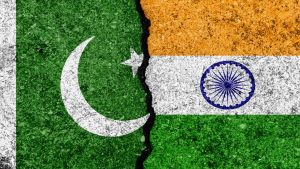






 Listen to the Article
Listen to the Article  Daily Newsletter
Daily Newsletter





